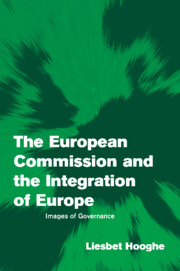Book contents
- Frontmatter
- Contents
- List of figures
- List of tables
- Preface
- Prologue
- 1 Preference formation in the European Commission
- 2 Men (and women) at Europe's helm
- 3 Images of Europe
- 4 Beyond supranational interest
- 5 Capitalism against capitalism
- 6 Principal or agent
- 7 Accommodating national diversity
- 8 Conclusion
- Appendix I Statistics
- Appendix II Description of independent variables
- Appendix III Survey material
- References
- Index
1 - Preference formation in the European Commission
Published online by Cambridge University Press: 22 September 2009
- Frontmatter
- Contents
- List of figures
- List of tables
- Preface
- Prologue
- 1 Preference formation in the European Commission
- 2 Men (and women) at Europe's helm
- 3 Images of Europe
- 4 Beyond supranational interest
- 5 Capitalism against capitalism
- 6 Principal or agent
- 7 Accommodating national diversity
- 8 Conclusion
- Appendix I Statistics
- Appendix II Description of independent variables
- Appendix III Survey material
- References
- Index
Summary
Senior civil servants work in two worlds simultaneously: they make and take orders for routine actions in the hierarchical world of public administration, on the basis of formal rules, cost–benefit analysis, and expertise; and they mobilize support for contentious decisions in the non-hierarchical world of politics, through networking and arm-twisting. Combining politics with expertise is indispensable in modern governance. Yet the relationship between these two worlds is delicate and contested, and senior civil servants, who are the interface between them, are directly affected.
Several institutional characteristics of the European Union exacerbate the tension between political agenda-setting and bureaucratic service (Hooghe 1997; Page 1997). In conjunction with the College of Commissioners, the officials of the European Commission have a constitutional obligation to set the legislative agenda because they have exclusive formal competence to draft EU legislation (except in foreign policy and some asylum and immigration issues). This competence sets senior Commission officials apart from their counterparts in national administrations. So they promote the policies of their directorate to private interests, politicians, public, and, last but not least, reluctant Commission colleagues. They direct negotiations between the Commission, on the one hand, and the Council of Ministers' working groups, the European Parliament, and interest groups, on the other. They broker legislative negotiations between the Council of Ministers and the European Parliament. Yet, as career civil servants, they also execute and administer political decisions taken by elected leaders. In that capacity, they provide administrative and managerial leadership to over 4,000 Commission administrators.
- Type
- Chapter
- Information
- The European Commission and the Integration of EuropeImages of Governance, pp. 6 - 30Publisher: Cambridge University PressPrint publication year: 2002



